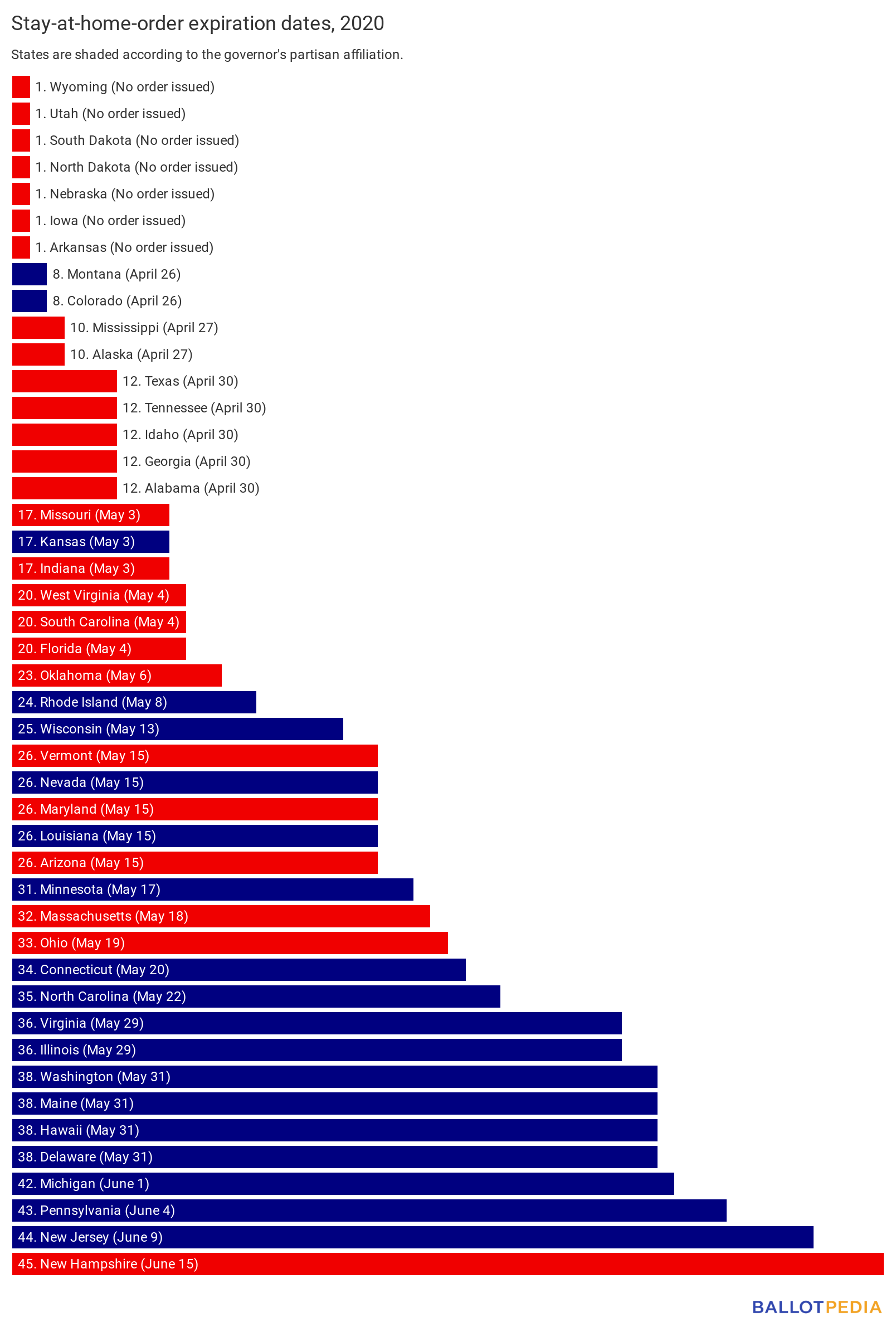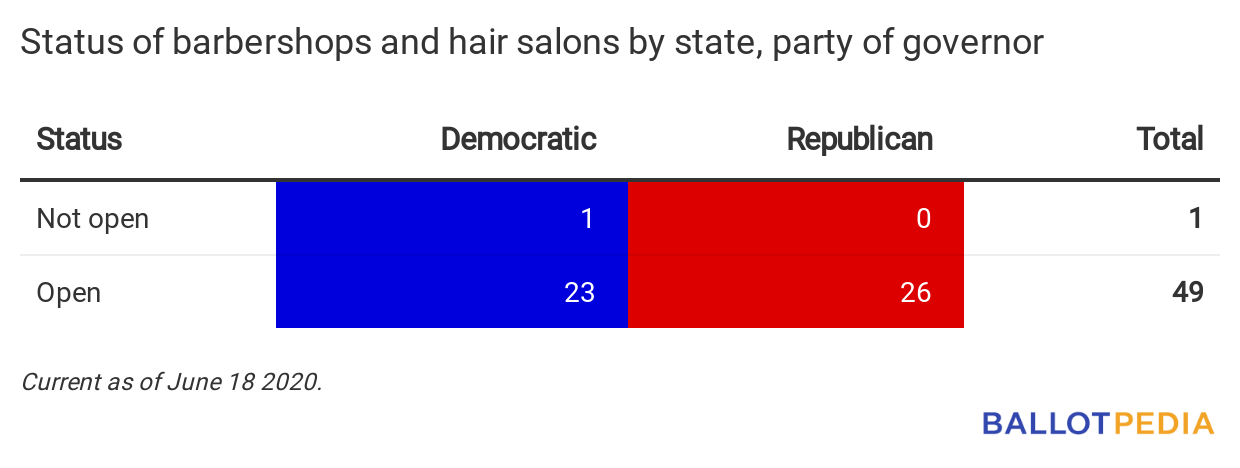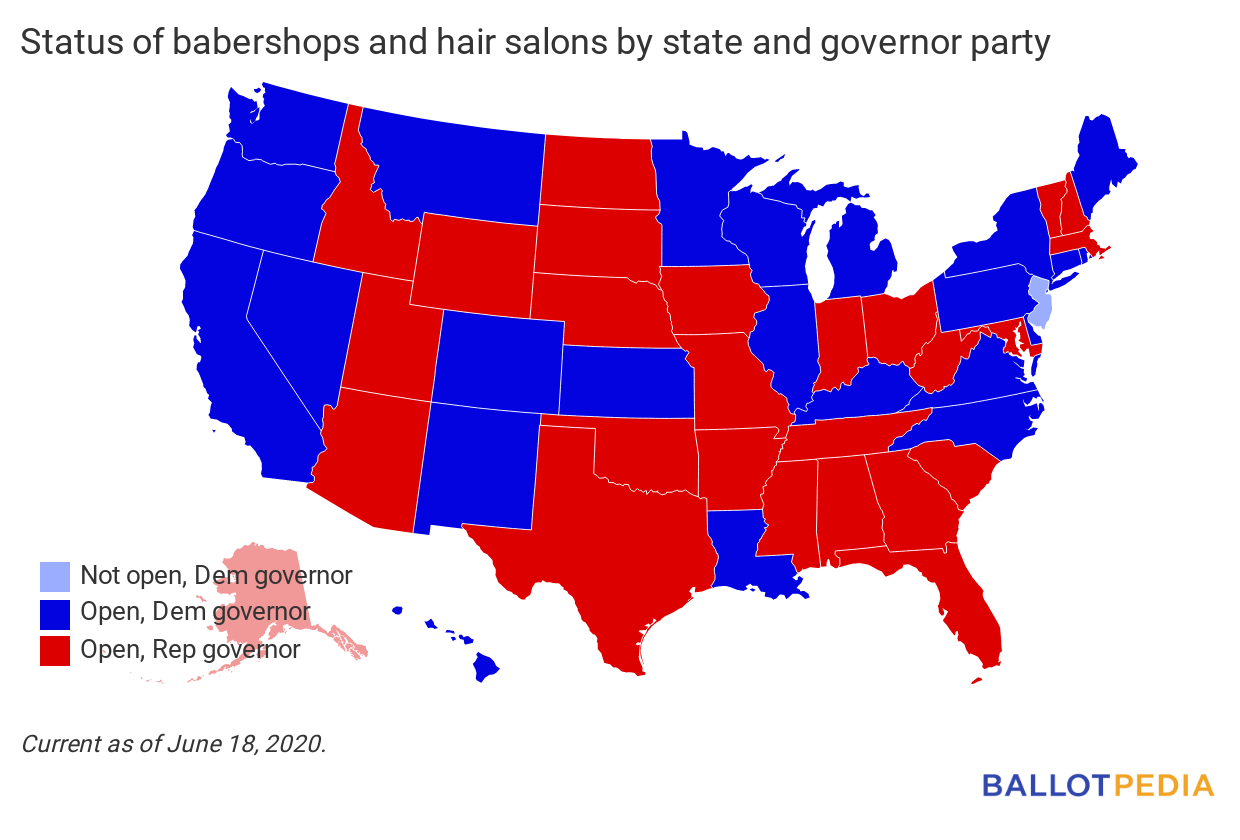Each day, we:
- Track the status of reopening in all 50 states.
- Compare the status of one industry or activity across the country.
- Provide in-depth summaries of the latest reopening plans.
- Give you the latest stories on other reopening plans and ideas.
Want to know what happened yesterday? Click here.
The next two days
What is reopening in the next two days? Which stay-at-home orders will expire?
June 19
- Maryland (divided government): Effective 5:00 p.m. on June 19, the following businesses will be allowed to reopen: indoor fitness centers, including gyms, martial arts studios, and dance studios (50% capacity); casinos; arcades; and malls. All reopenings will be subject to local approval.
- Oregon (Democratic trifecta): Gov. Kate Brown (D) announced Marion, Polk, and Hood River counties could move into Phase Two of reopening and Multnomah County could enter Phase One starting June 19. She said Multnomah, Washington, and Clackamas counties and Marion and Polk counties would be grouped as two regional units for future reopenings. Brown also ordered a mask requirement for public indoor activities (like grocery shopping) for Multnomah, Washington, Clackamas, Hood River, Marion, Polk, and Lincoln counties.
- Pennsylvania (divided government): Eight more yellow-phase counties will enter the green phase of reopening on June 19. Gov. Tom Wolf (D) asked the state’s Supreme Court to decide a lawsuit filed by the Republican-controlled state legislature. The suit was filed after Wolf did not act on a legislative resolution calling on him to end Pennsylvania’s emergency declaration and lift all business shutdown orders issued in response to the coronavirus. Republicans argue the legislature can pass a concurrent resolution compelling the governor to terminate a state of disaster emergency. Wolf says all resolutions have to be presented to him to approve or veto and the legislative resolution does not carry legal force without his signature.
- Vermont (divided government): Gov. Phil Scott (R) announced that limited outdoor visits can resume at long-term care facilities beginning on June 19. Each resident will be allowed two visitors per day.
Since our last edition
What is open in each state? For a continually updated article on reopening status in all 50 states, click here. For our last edition, click here.
- Arkansas (Republican trifecta): Gov. Asa Hutchinson (R) announced that long-term care facilities could accept visitors beginning July 1. Facilities will have to meet state guidelines to accept visitors.
- Michigan (divided government): On June 17, Gov. Gretchen Whitmer (D) announced that Michigan schools could resume in-person instruction during Phase 4 of the state's reopening (the state entered Phase 4 on June 1). Whitmer said she would issue an executive order June 30 outlining requirements and recommendations for reopening the state's traditional public, charter, private, and parochial schools.
- New Hampshire (divided government): At a news conference on June 18, Gov. Chris Sununu (R) announced that amusement parks, movie theaters, adult day services, arts and music education, and performing arts venues could reopen on June 29.
- New Jersey (Democratic trifecta): Gov. Phil Murphy (D) signed an executive order which will allow in-person clinical, lab, and hands-on programming at higher education institutions to resume on July 1. Trade and training schools will also reopen on July 1.
- New York (Democratic trifecta): Gov. Andrew Cuomo (D) announced on June 18 that New York City is expected to move into Phase 2 of his reopening plan on June 22. Cuomo said a final decision would be announced on June 19. Phase 2 allows outdoor dining at bars and restaurants (50% capacity), the opening of hair salons and barbershops (50% capacity), and office-based jobs (50% capacity). New York City Mayor Bill DeBlasio said on June 18 that he felt the city was ready to move into Phase 2 on June 22. New York City playgrounds will also be able to reopen on June 22, if the CIty moves into Phase 2.
- Tennessee (Republican trifecta): The Knox County Board of Health announced on June 18 that Knox County would adopt Gov. Bill Lee’s (R) reopening plan on July 1. Lee permitted six counties, including Knox, to follow reopening plans from local health departments. Knox will remain in Phase 2 of its reopening plan for two weeks, before aligning with the state’s.
- Virginia (Democratic trifecta): At a press conference on June 18, Gov. Ralph Northam (D) revealed details about Phase Three of the reopening plan. Among the changes included in Phase Three, gatherings of up to 250 people will be permitted, and capacity restrictions on restaurants and retail will be lifted. Gyms and fitness centers will be permitted to operate at 75% capacity. Northam did not give a date for when Virginia will enter Phase 3.
- Washington (Democratic trifecta): Gov. Jay Inslee (D) released updated guidelines for religious services on June 18. Counties in Phase 3 of the Safe Start reopening plan can hold services indoors with up to 400 people or 50% capacity, whichever is less. For counties in the modified Phase 1 or Phase 2, indoor services can take place with up to 200 people or 25% capacity, whichever is less.
Update on stay-at-home orders
Forty-three states issued orders directing residents to stay home except for essential activities and the closure or curtailment of businesses each state deemed nonessential. Seven states did not.
As of June 18, stay-at-home orders have ended in 38 states. Nineteen of those states have Republican governors and 19 have Democratic governors (including Wisconsin, where the state Supreme Court invalidated the stay-at-home order).
The five states with active stay-at-home orders have Democratic governors. They are (with expiration date):
- New York (June 27)
- New Mexico (June 30)
- California (no set expiration date)
- Kentucky (no set expiration date)
- Oregon (no set expiration date)
Here's which stay-at-home orders have expired.

Tracking industries: Barbershops and salons
All 50 states began to reopen in some way. Here, we give the status of one industry or activity across the states. Today’s question: in which states may you go out for a haircut?
New Jersey is the only state where personal care businesses remain closed. Barbershops and salons will be allowed to reopen on June 22. Businesses will be required to screen customers and staff, limit capacity, and operate by appointment only.
 
|

This is an in-depth summary of one of the latest reopening plans. Is there a plan you'd like us to feature? Reply to this email and let us know. Click a state below to read a previous Featured Plan.
On April 27, Rhode Island Gov. Gina Raimondo (D) released an outline of a three-phase reopening plan. Rhode Island entered Phase I on May 9 and Phase II on June 1. Raimondo plans to discuss details of Phase III in a press briefing on June 19.
Raimondo said the state's reopening would begin when all of the following questions could be answered with "yes":
| “ |
- Has the rate of spread continued to decrease?
- Do we have the capacity to quickly identify community spread on an ongoing basis before a major outbreak occurs?
- Do we have the necessary supports in place for vulnerable populations and for anyone in quarantine?
- Does our healthcare system have the capacity and the PPE to handle future surges?
- Do businesses, schools, childcare sites, faith organizations, and recreational spaces have plans for long-term social distancing?
- Are we prepared to reimpose measures, or reclose certain sectors of the economy, if it becomes necessary?
|
” |
On May 22, Raimondo announced the state would enter Phase II on June 1. She said, "It’s going to be a big phase. There’s going to be a lot of changes and it’s a big reopening relative to what we’ve done. Which means, the thought in your head should be, 'Oh, man, I’d better follow the rules so we can get through it safely.'"
The state has released sector-specific requirements and recommendations for reopening businesses.
Context
- On March 28, Raimondo signed a stay-at-home order closing noncritical businesses and directing residents to stay home except for necessary activities. The order also limited gathering size to no more than five people, directed individuals to socially distance when outside the home, and avoid touching frequently touched surfaces. It also requires out-of-state travelers to self-quarantine for 14 days unless traveling to Rhode Island for work. Raimondo extended the order, initially set to expire April 13, and it expired on May 8. Effective May 8, Raimondo ordered residents to wear face coverings when outside the home and unable to continuously maintain 6 feet of distance from others. That order remains in effect.
- As of June 17, Rhode Island had 16,269 positive COVID-19 cases and 885 deaths. Rhode Island's estimated population as of July 2019 was 1.1 million. For every 100,000 residents, Rhode Island had 1,535.7 cases and 83.5 deaths.
- Rhode Island is a Democratic trifecta, with a Democratic governor and Democratic majorities in both chambers of the state legislature.
Plan details
Guidance for individuals
| “ |
- Don’t go out if you are sick.
- Continue washing hands and following other hygiene best practices.
- Maintain six-foot spacing.
- Wear a face covering.
- Limit group sizes per RI Department of Health guidance
|
” |
Guidance for businesses
In addition to the sector-specific guidance documents linked below, the ReopeningRI.com website contains FAQs, guideline illustrations, checklists, and more for businesses.
Criteria for moving between phases
| “ |
- A 14-day downward trend in the number of cases OR
- A 14-day trend in stable or declining hospitalizations.
- We also must:
- Be capable of identifying community spread through:
- Testing all symptomatic people within 48-72 hours and running consistent random sample testing.
- Ensuring all communities in RI have access to testing, especially those that have been disproportionately impacted.
- Ensuring the overwhelming majority of contact tracing and case investigation is complete in 24 hours.
- Meet the overwhelming majority of needs for those in quarantine and isolation.
- Have at least 30% of ICU beds open and sufficient PPE to protect healthcare workers.
- Have developed appropriate workplace guidance and regulations to support sectors in safely reopening.
- Be prepared to use a data-based approach to assess trends and determine if restrictions need to be reinstated.
|
” |
Phase I (Began May 9)
Individual/social
- "Religious ceremonies: Limited to 5 or fewer (with staff included in the 5-person cap). Funerals and end-of-life rituals limited to 10 or fewer attendees (with staff not included in the 10-person cap)."
- Stay-at-home order lifted, but people still encouraged to stay close to home
- Gatherings limited to 5 or less
Businesses/sites
The following were allowed to resume or reopen in Phase I. Click the links below for sector-specific guidelines.
- Working from home still recommended
- Noncritical retail with capacity limits
- Manufacturing, construction, and service-based businesses
- Limited childcare
- "Healthcare: Hospitals and physician offices remain open, putting precautions in place to keep patients and staff safe. Telehealth remains encouraged. Elective procedures resume under strict safety precautions."
- "Offices: Office-based businesses may begin to allow limited onsite visits for staff (e.g., to pick up equipment) who have been working remotely."
- Limited state park reopening with reduced parking
- Restaurants for outdoor dining (May 18 reopening)
COVID-19 control plan
Businesses had until May 18 to develop a written COVID-19 Control Plan detailing precautions they implemented to prevent the spread of the virus. The state released a required Control Plan template for businesses to fill out. Businesses did not need to submit their plan to the state for review, but the directive required businesses to be prepared to provide it to the Rhode Island Department of Health if requested. It also required noncritical retailers to sign and display a compliance checklist in an area visible to employees and visitors and required businesses that had not yet opened to complete the Control Plan and checklist requirements before reopening.
Phase II (Began June 1)
Individual/social
- Social gatherings limited to 15 people
- 14-day quarantine only for those returning to R.I. from an area still under stay-at-home restrictions
- Houses of worship could reopen at up to 25% capacity (starting May 30)
Businesses/sites
The following could resume or reopen as part of Phase II. In addition to sector-specific guidelines linked below, the state released general business/organization guidelines.
- Office-based businesses for up to 33% of workforce, if necessary
- All state parks and beaches with capacity limits
- Noncritical retailers/malls for more customers
- Restaurants for indoor dining up to 50% capacity
- Personal services (i.e., barbershops, salons, braiders, nail care, waxing, tanning, massage, and tattoo services)
- Gyms, fitness studios, and small-group fitness classes
- Outdoor entertainment/recreation activities (i.e., zoos, outdoor areas of historical sites)
- Childcare services
- Libraries for limited in-person services
- Summer youth sports for limited activities
- Summer camps and other youth summer programs (starting June 29)
COVID-19 control plan
Businesses reopening in Phase II are required to develop a COVID-19 control plan, as described in the Phase I section above.
Phase III (Details forthcoming)
Raimondo planned to announce Phase III details at a press briefing on June 19. The April 27 reopening plan outline said the following about Phase III:
| “ |
We can look forward to schools opening with restrictions and seeing more of our families and friends. Offices, restaurants, retail and other businesses will lift some of the tightest restrictions to allow more people in at one time but will need to operate under long-term safety guidelines. Social gatherings are limited to 50 people. Older adults (65+) and those with underlying health conditions are no longer strongly encouraged to stay home. These individuals are reminded to exercise significant caution in public. Masks, vigilant hand-washing and increased cleaning must remain in place. Working from home is still encouraged where possible but more people will return to the workplace. All activities must account for strong social distancing guidelines of remaining 6-feet apart. |
” |
Raimondo's plan outline also described the following as "Beyond Phase III":
| “ |
Gathering and working restrictions will further relax. Additional businesses will open, and more group activities will be allowed. Along the way, we’ll innovate as we challenge ourselves to find new and better ways of operating and living. |
” |
Reactions
- The Narragansett Town Council was set to vote on a resolution authorizing local police to not enforce Raimondo's emergency orders. Council President Matthew Mannix withdrew the resolution May 18, saying he heard several council members were planning to vote against it. Mannix said, "Many opponents of my resolution have made emotional pleas citing health concerns, yet I have seen very little grassroots opposition to big-box stores remaining open while small businesses, that the state deems nonessential, are forced to close."
- Raimondo said of the resolution, "That is a huge mistake. … That is not based in fact, science, good analysis, and it is so selfish to all of the people of Rhode Island who have worked so hard, for so long, putting their lives on hold, their children’s education in their home, their businesses on hold, so we can all be safe. To jump the gun a couple of weeks before we are ready ... to jump the gun in such a fulsome way, it is a huge risk. … That is a reckless thing to do and I really hope they don’t do it."
- Providence Mayor Jorge Elorza issued an executive order effective May 9 aligning with some of the state's Phase I reopening plan but implementing stricter restrictions in some areas, such as requiring the use of face coverings outside the home without an exemption for those socially distancing and requiring parking lots at parks to remain closed. The order was set to expire on June 5, whereas Raimondo's order was set to expire on May 23.
- Councilman Pedro Espinal supported the order, saying, "We have suffered. … It’s an extreme time in Providence, that takes extreme measures."
- Councilman John Igliozzi opposed the order, saying, "We are consistently inconsistent."
Additional activity
In this section, we feature examples of activities by other federal, state, and local governments and influencers relevant to recovering from the pandemic.
- Arizona Gov. Doug Ducey (R) announced he would allow city and county officials to require residents to wear masks. Previously, Ducey had said he would not allow local officials to make such decisions because he wanted one statewide standard.
- On June 15, the Illinois Republican Party and three local Republican groups sued Gov. J.B. Pritzker (D) in the U.S. District Court for the Northern District of Illinois. Plaintiffs said their First and Fourteenth Amendment rights had been violated because, "unlike churches, political parties are barred from gathering in groups greater than 10 under the Governor’s Executive Order 2020-38." Plaintiffs said that "[w]hen the state grants access to one set of speakers, it must give equal access and treatment to all speakers of a similar character," contrasting their treatment to both that of churches and protesters. Plaintiffs asked the court to prevent the state from enforcing Executive Order 2020-38 against political parties. Pritzker’s representative, Jordan Abudayyeh, said, "[As] the Republicans who attended protests against the public health guidance are well aware, the State has never prevented people from exercising their First Amendment rights."
- New Hampshire theme park, Canobie Lake, announced a targeted reopening date of July 16 for its 2020 season. The park is implementing new safety policies and procedures for guests and staff.
- Bars and breweries in Chicago, Illinois were allowed to reopen for outdoor service June 17. Tables must be 6 feet apart, and no more than six patrons are allowed at each table. Alcohol sales for on-site consumption must end at 11 p.m., and patrons may be seated for a maximum of 2 hours.
- Mayor John Cooper announced Nashville, Tennessee will enter Phase 3 of its reopening plan on Monday, June 22.
|






